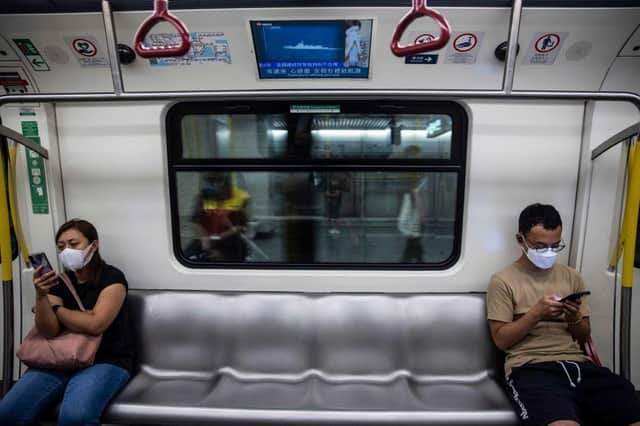Worsening relations between US and China as Taiwan tensions grow


US house speaker Nancy Pelosi was the highest-ranking US official to visit the self-governing island in 25 years. China claims Taiwan as its own territory and opposes it having its own engagements with foreign governments.
The decision to block further talks – which have been intermittent since they began following the Paris Climate Accord in 2015 – is the latest in a promised series of steps intended to punish the US for allowing the visit to the island.
Advertisement
Hide AdAdvertisement
Hide AdChina on Thursday launched threatening military exercises in six zones of the Taiwan Strait that it says will run until Sunday, in a direct retaliation to Ms Pelosi’s visit. Missiles have also reportedly been fired over Taiwan.
Hours later, Chinese officials announced unspecified sanctions on Ms Pelosi, with the foreign ministry in Beijing saying the US house speaker had disregarded China's concerns and resolute opposition to her visit.
Late last year, Chinese President Xi Jinping warned against rising tensions in the Asia-Pacific region leading to a new Cold War. He has said that he wants to unify China and Taiwan by peaceful means, but has not ruled out force.
Experts have warned that Beijing’s decision to fire missiles sent a message to both the US and Japan that they would both become targets if they tried to interfere in any future plans to annex Taiwan by force.
Daniel Sneider, an expert on Japan’s foreign relations at Stanford University, told The New York Times that the Chinese “want to demonstrate that they have the capability to impose a blockade on Taiwan, and they want to send a very clear message to those that would come to the aid of Taiwan — the US and Japan — that they can target them as well.”
Ms Pelosi has stood defiant over her decision to make the visit, saying that China will not isolate Taiwan by preventing American officials from travelling there.
However, her decision caused debate on home soil, as well as flaring tensions in Asia. A month ahead of her trip, US president Joe Biden cast doubt on his support for her trip by suggesting that the Pentagon saw it as too risky. “The military thinks it’s not a good idea right now,” he told reporters.
The Chinese have tried to isolate Taiwan, Ms Pelosi said, including most recently by preventing it from joining the World Health Organisation.
Advertisement
Hide AdAdvertisement
Hide Ad"They may try to keep Taiwan from visiting or participating in other places, but they will not isolate Taiwan by preventing us to travel there," she said.
On Thursday, China cancelled a foreign ministers' meeting with Japan to protest a statement from the Group of 7 nations that said there was no justification for Beijing's military exercises, which virtually encircle Taiwan. Chinese foreign minister Wang Yi also made a public display of the country’s relationship with Russia as he patted the Kremlin’s Sergei Lavrov on the shoulder as he entered the room and gave the already-seated Mr Lavrov a quick wave before taking his own seat. Mr Lavrov waved back in response.
"Japan, together with other member of the G7 and the EU, made an irresponsible statement accusing China and confounding right and wrong," Chinese foreign ministry spokeswoman Hua Chunying said in Beijing.
When Japan's foreign minister Hayashi Yoshimasa began to speak at the East Asia Summit, both Mr Lavrov and Mr Wang walked out of the room, according to a diplomat in the room.
China’s Foreign Ministry said dialogue between US and Chinese regional commanders and defence department heads would be cancelled, along with talks on military maritime safety.
Co-operation on returning illegal immigrants, criminal investigations, transnational crime, illegal drugs and climate change will be suspended, the ministry said.
Climate change and fighting trade in illegal drugs such as fentanyl were, however, areas where they had found common cause, and Beijing's suspension of co-operation could have significant implications for efforts to achieve progress in those issues.
US and China’s top climate diplomats, John Kerry and Xie Zhenhua, maintained a cordial relationship that dated back to the Paris climate accord, which was made possible by a breakthrough negotiated among the two and others.
Advertisement
Hide AdAdvertisement
Hide AdAt last year’s COP26 climate summit in Glasgow, China committed to working with the US "with urgency" to cut climate-wrecking emissions, however, US special envoy Mr Kerry was unable to persuade it to significantly speed up its move away from coal.
Originally colonised by the Dutch and Spanish in the early part of 17th century, Taiwan was increasingly integrated into the Qing empire by the end of the 1600s. Following the First Sino-Japanese War in 1895, the Qing ceded the island, along with Penghu, to the Empire of Japan.
At the end of the Second World War, the nationalist government of the Republic of China (ROC), led by the Kuomintang (KMT), took control of Taiwan, however there was no transfer of territorial sovereignty. Following the February 28 massacre in 1947, martial law was declared in 1949 by the Governor of Taiwan Province, Chen Cheng, and the ROC Ministry of National Defense. Following the end of the Chinese Civil War in 1949, the ROC government retreated from the mainland into Taiwan as the Communists proclaimed the establishment of the People's Republic of China.
In 1987, martial law was lifted and Taiwan began a democratisation process, culminating with the first direct president election in 1996. In 2000, the Democratic Progressive Party came to power and began to explore independence, however this has been blocked by the Chinese authorities.
Some 59 countries – as well as the European Union – have established unofficial diplomatic relations with Taiwan, including the United States, France, Germany, Japan, Russia, and the United Kingdom.
Comments
Want to join the conversation? Please or to comment on this article.
